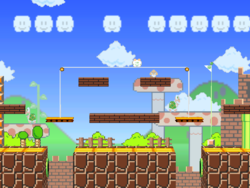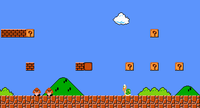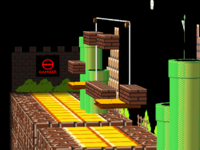Mushroom Kingdom (SSBM): Difference between revisions
m (Text replacement - ".svg|50px]]" to ".svg|50px|class=invert]]") |
m (Text replacement - " *\| *hometo *= *[^\n]*\n" to "") |
||
| (9 intermediate revisions by 7 users not shown) | |||
| Line 8: | Line 8: | ||
|universe = {{uv|Mario}} | |universe = {{uv|Mario}} | ||
|games = ''[[Melee]]'' | |games = ''[[Melee]]'' | ||
|availability = [[Starter stage|Starter]] | |availability = [[Starter stage|Starter]] | ||
|meleesingles = [[Banned stage|Banned]] | |meleesingles = [[Banned stage|Banned]] | ||
|meleedoubles = [[Banned stage|Banned]] | |meleedoubles = [[Banned stage|Banned]] | ||
|meleemusic = Main: ''{{MeleeMusic|Mushroom Kingdom}}''<br>Alternate: ''{{MeleeMusic|Dr. Mario}}'' | |meleemusic = Main: ''{{MeleeMusic|Mushroom Kingdom}}''<br>Alternate: ''{{MeleeMusic|Dr. Mario}}'' | ||
|interwiki | |interwiki=mariowiki | ||
|interwikiname= Super Mario Wiki | |interwikiname=Super Mario Wiki | ||
|interwikipage= Mushroom Kingdom | |interwikipage=Mushroom Kingdom | ||
}} | }} | ||
'''Mushroom Kingdom''' ({{ja|いにしえの王国|Inishie no Ōkoku}}, ''Ancient Kingdom'') is a [[starter stage]] in ''[[Super Smash Bros. Melee]]''. It is {{SSBM|Luigi}} and {{SSBM|Dr. Mario}}'s home stage. In [[All-Star]] mode, this stage is played on when Luigi and any of his teammates are faced. | '''Mushroom Kingdom''' ({{ja|いにしえの王国|Inishie no Ōkoku}}, ''Ancient Kingdom'') is a [[starter stage]] in ''[[Super Smash Bros. Melee]]''. It is {{SSBM|Luigi}} and {{SSBM|Dr. Mario}}'s home stage. In [[All-Star]] mode, this stage is played on when Luigi and any of his teammates are faced. | ||
| Line 23: | Line 22: | ||
== Origin == | == Origin == | ||
[[File:1-1SMB.png|thumb|left | [[File:1-1SMB.png|thumb|left|This stage has a variety of elements from ''Super Mario Bros.'', some of which can be seen here in World 1-1.]] | ||
This stage is based on the overworld levels of ''{{s|mariowiki|Super Mario Bros.}}'', and the | This stage is based on the overworld levels of ''{{s|mariowiki|Super Mario Bros.}}'' The overworld levels often feature ground blocks as the main platform, and a background consisting of green mountains and blue cloudy skies. In each overworld level, the player must reach the {{s|mariowiki|Fortress}} at the end of each level by touching the {{s|mariowiki|Goal Pole}}. | ||
The overworld levels often featured a ground block as the main platform. Among the other platforms include the {{s|mariowiki|Brick Block}}s, which can be destroyed by hitting them from underneath; the [[mariowiki:Mushroom Platform|mushroom-shaped platforms]] introduced in [[mariowiki:World 4-2 (Super Mario Bros.)|World 4-2]]; and the {{s|mariowiki|Cloud Block}} featured in hidden areas above the ground, which can be accessed by a hidden [[mariowiki:Beanstalk|beanstalk]] serving as a ladder. The {{s|mariowiki|? Block}}s will often turn into {{s|mariowiki|Empty Block}}s after being hit, either to release items or to release a beanstalk that leads the player to the hidden areas above the ground. The overworld levels also feature {{s|mariowiki|Warp Pipe}}s, where some of them allow the player to access underground levels or bonus rooms. When underground, the player has to go into another Warp Pipe to return to the overworld. | |||
The {{s|mariowiki|Scale Lift}}s also debuted as platforms in [[mariowiki:World 3-3 (Super Mario Bros.)|World 3-3]] in ''Super Mario Bros.'' When the player stands on one platform, it will drop down while the other platform connected to it goes up. If the player stands on the platform for too long, the scale breaks and both platforms fall. | |||
The enemies featured in the overworld levels include the [[Goomba]], the [[Koopa Troopa]], and the [[Lakitu]]. | |||
This stage features multiple elements from the overworld levels in ''Super Mario Bros.'' The sides of the main platform's pitfalls feature the exits of the Warp Pipes; however, in this stage, they cannot be entered or used. The Goomba, the Koopa Troopas, and the Lakitu appear as [[background characters]]. | |||
{{clrl}} | {{clrl}} | ||
==Tournament legality== | ==Tournament legality== | ||
Due to it having [[cave of life|caves of life]] on behalf of the bricks included in the stage, as well as walk-off blast-lines, an irregular design, and being able to tech off of the bricks, Mushroom Kingdom is banned in tournaments. | |||
Due to it having [[cave of life|caves of life]] on behalf of the bricks included in the stage, as well as walk-off blast-lines, an irregular design, and being able to tech | |||
==Names in other languages== | ==Names in other languages== | ||
| Line 47: | Line 52: | ||
==Trivia== | ==Trivia== | ||
[[File:MushroomKingdomBlastLine.png|thumb | [[File:MushroomKingdomBlastLine.png|thumb|The blast lines on Mushroom Kingdom.]] | ||
*Like in its ''SSB'' counterpart, the camera can be panned far enough to either side to see black signs with a red circle and the word "Danger" off to the side. The sign itself is behind the blast line. | *Like in its ''SSB'' counterpart, the camera can be panned far enough to either side to see black signs with a red circle and the word "Danger" off to the side. The sign itself is behind the blast line. | ||
*In the beta version of the game, the arena had a slightly different look, similar to the ''[[SSB]]'' version. Most notably was the presence of Warp Pipes near the corners of either side that could presumably be accessed. | *In the beta version of the game, the arena had a slightly different look, similar to the ''[[SSB]]'' version. Most notably was the presence of Warp Pipes near the corners of either side that could presumably be accessed. | ||
| Line 55: | Line 60: | ||
*Mushroom Kingdom is one of the five stages in the ''Smash Bros.'' series to change music when the [[Match timer|timer]] reaches 30 seconds and during [[Sudden Death]], the others are {{SSB|Mushroom Kingdom}}, Mushroom Kingdom II, [[Suzaku Castle]] (if the music played is any type of one of the sixteen playable characters in ''Street Fighter II'' and ''Super Street Fighter II'') and [[Moray Towers]]. | *Mushroom Kingdom is one of the five stages in the ''Smash Bros.'' series to change music when the [[Match timer|timer]] reaches 30 seconds and during [[Sudden Death]], the others are {{SSB|Mushroom Kingdom}}, Mushroom Kingdom II, [[Suzaku Castle]] (if the music played is any type of one of the sixteen playable characters in ''Street Fighter II'' and ''Super Street Fighter II'') and [[Moray Towers]]. | ||
**Additionally, it is the only one of these stages to not return in ''[[Super Smash Bros. Ultimate]]''. | **Additionally, it is the only one of these stages to not return in ''[[Super Smash Bros. Ultimate]]''. | ||
* | *Mushroom Kingdom is one of the few stages to not return in ''Ultimate'', having been passed over in favor of its ''SSB'' variant. | ||
**It is also one of two ''Mario'' stages not to appear, the other being [[Rainbow Road]] from ''Super Smash Bros. for Nintendo 3DS''. | **It is also one of two ''Mario'' stages not to appear, the other being [[Rainbow Road]] from ''Super Smash Bros. for Nintendo 3DS''. | ||
Latest revision as of 14:18, June 29, 2023
| Mushroom Kingdom | |
|---|---|
  Mushroom Kingdom in Super Smash Bros. Melee. | |
| Universe | Mario |
| Appears in | Melee |
| Availability | Starter |
| Article on Super Mario Wiki | Mushroom Kingdom |
Mushroom Kingdom (いにしえの王国, Ancient Kingdom) is a starter stage in Super Smash Bros. Melee. It is Luigi and Dr. Mario's home stage. In All-Star mode, this stage is played on when Luigi and any of his teammates are faced.
Stage overview[edit]
The stage is split up into three sections: two small platforms on the left and right, and one main one in the middle. Between the outer ones are two pits. Over the right and left platforms, there are three blocks while the middle platform has two rows of blocks above it (three blocks each on the left and right sides at the top, and seven blocks below them). Usually, most of the blocks are Brick Blocks, except for two, which are ? Blocks. These blocks can be broken, and breaking the ? Blocks will produce an item. Once in a while, all the blocks will reappear as ? Blocks. There is also a Scale Lift holding two platforms, each above a pit. If players stand on one too long, they will break off and fall into the pits, reappearing a few seconds afterwards. The speed of the falling and rising platforms depends on fighters' weights. The lighter the fighter is, the slower their platform will fall and the other rises. Noticeably, but often unspoken of by Smash Bros. players, the Melee version doesn't use warp pipes like the original. However, by pausing and turning the camera, warp pipes that exit in the pits like in the original are visible but are behind the playable area of the stage and cannot be entered. If one pauses and turns the camera all the way to the right or left, a black wall marked with the word DANGER can be seen, which is appropriate, as those areas are past the side blast lines.
Origin[edit]
This stage is based on the overworld levels of Super Mario Bros. The overworld levels often feature ground blocks as the main platform, and a background consisting of green mountains and blue cloudy skies. In each overworld level, the player must reach the Fortress at the end of each level by touching the Goal Pole.
The overworld levels often featured a ground block as the main platform. Among the other platforms include the Brick Blocks, which can be destroyed by hitting them from underneath; the mushroom-shaped platforms introduced in World 4-2; and the Cloud Block featured in hidden areas above the ground, which can be accessed by a hidden beanstalk serving as a ladder. The ? Blocks will often turn into Empty Blocks after being hit, either to release items or to release a beanstalk that leads the player to the hidden areas above the ground. The overworld levels also feature Warp Pipes, where some of them allow the player to access underground levels or bonus rooms. When underground, the player has to go into another Warp Pipe to return to the overworld.
The Scale Lifts also debuted as platforms in World 3-3 in Super Mario Bros. When the player stands on one platform, it will drop down while the other platform connected to it goes up. If the player stands on the platform for too long, the scale breaks and both platforms fall.
The enemies featured in the overworld levels include the Goomba, the Koopa Troopa, and the Lakitu.
This stage features multiple elements from the overworld levels in Super Mario Bros. The sides of the main platform's pitfalls feature the exits of the Warp Pipes; however, in this stage, they cannot be entered or used. The Goomba, the Koopa Troopas, and the Lakitu appear as background characters.
Tournament legality[edit]
Due to it having caves of life on behalf of the bricks included in the stage, as well as walk-off blast-lines, an irregular design, and being able to tech off of the bricks, Mushroom Kingdom is banned in tournaments.
Names in other languages[edit]
Trivia[edit]
- Like in its SSB counterpart, the camera can be panned far enough to either side to see black signs with a red circle and the word "Danger" off to the side. The sign itself is behind the blast line.
- In the beta version of the game, the arena had a slightly different look, similar to the SSB version. Most notably was the presence of Warp Pipes near the corners of either side that could presumably be accessed.
- Tiny Jigglypuff, Fox, Kirby, Mr. Game & Watch, and Pichu can stand on the floating platform indefinitely, without it falling.
- The moving platforms are an easy way to compare weight.
- Mushroom Kingdom and Mushroom Kingdom II are the only two stages in Melee to share an alternate music track: Dr. Mario. They are also the only two stages in Melee to lack a stage prefix.
- Mushroom Kingdom is one of the five stages in the Smash Bros. series to change music when the timer reaches 30 seconds and during Sudden Death, the others are Mushroom Kingdom, Mushroom Kingdom II, Suzaku Castle (if the music played is any type of one of the sixteen playable characters in Street Fighter II and Super Street Fighter II) and Moray Towers.
- Additionally, it is the only one of these stages to not return in Super Smash Bros. Ultimate.
- Mushroom Kingdom is one of the few stages to not return in Ultimate, having been passed over in favor of its SSB variant.
- It is also one of two Mario stages not to appear, the other being Rainbow Road from Super Smash Bros. for Nintendo 3DS.
| Stages in Super Smash Bros. Melee | |
|---|---|
| Starter stages | Brinstar · Corneria · Fountain of Dreams · Great Bay · Green Greens · Icicle Mountain · Jungle Japes · Kongo Jungle · Mushroom Kingdom · Mute City · Onett · Pokémon Stadium · Princess Peach's Castle · Rainbow Cruise · Temple · Venom · Yoshi's Island · Yoshi's Story |
| Unlockable stages | Battlefield · Big Blue · Brinstar Depths · Final Destination · Flat Zone · Fourside · Mushroom Kingdom II · Poké Floats |
| Dream Land · Kongo Jungle · Yoshi's Island | |

